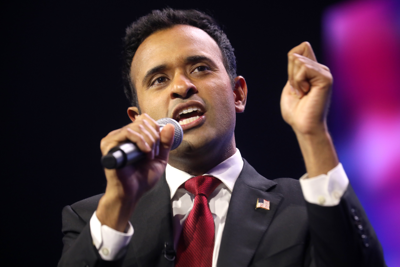Republican presidential candidate Vivek Ramaswamy this week proposed that a physical fitness test be added to the college admissions process as a way for colleges to diversify their student body.
“This is a pro-merit solution that rewards diverse talents,” Ramaswamy wrote on X, formerly known as Twitter. “It’s a fact that those who perform well on math & reading tests tend to perform more poorly on the 1-mile run, and vice versa.”
That’s actually not a fact. In fact, numerous studies show just the opposite. And experts told us there is no evidence that adding a physical fitness component to college admissions would help to diversify a college’s student body, either racially or economically.
Ramaswamy noted that while his idea was “not formally part of my Presidential platform” it was “a serious proposal to address multiple cultural & health challenges with a single actionable step: most solutions shouldn’t come top-down from government.”
Ramaswamy said his suggestion was prompted by a U.S. Supreme Court ruling in June that colleges and universities could no longer consider race as a factor in the admissions process, and would need to seek new ways to diversify.
“Now that the Supreme Court finally ended affirmative action, colleges will only further deprioritize SAT scores in favor of subjective factors because of large racial disparities in test results,” Ramaswamy wrote. “There’s a simple way forward that will drive excellence and diversity of talent among incoming college classes: the College Board should add a physical fitness section to the SAT, instead of just math and reading sections.”
Ramaswamy said it “could mirror the ‘Presidential Fitness Test’ – consisting of a 1-mile run, pull-ups, sit-ups, shuttle run, etc. – regularly administered across American high schools until the Obama White House disband it.” President Barack Obama did scrap the Presidential Fitness Test, but Ramaswamy fails to mention that he replaced it with the Presidential Youth Fitness Program, which emphasizes “the value of living a physically active and healthy lifestyle” and sets personal fitness goals.
The Association Between Fitness and Academic Achievement
Ramaswamy backed up his premise of adding a fitness test to college admissions as a means to diversify enrollment with the claim that “those who perform well on math & reading tests tend to perform more poorly on the 1-mile run, and vice versa.”
However, numerous studies show that, to the contrary, those who perform better on academic tests on subjects such as math and reading tend to have higher levels of physical activity.
“I can confirm that the relationship between physical fitness and academic outcomes is typically a positive correlation, meaning that when you look at a point in time, kids who are more fit tend to have better test scores,” said Rebecca London, an associate professor at the University of California Santa Cruz who has led published studies about the intersection of K-12 education and health and wellness.
“All and all, Ramaswamy doesn’t appear to know what he is talking about relative to fitness and academic performance, and I am unaware of any data to back up his statement,” Charles Hillman, associate director of the Center for Cognitive & Brain Health at Northeastern University, told us via email.
Studies have also found that higher income tends to correlate with higher fitness, and vice versa. And studies do not suggest physical activity or fitness levels among racial minorities would provide a boost if fitness tests were included in college admissions.
“I don’t see why adding a physical fitness portion to the SAT would diversify a college campus,” Hillman said. “From 23 years of human subjects research, much of it with college samples, I can tell you that fitness is already quite diverse on college campuses.”
London concurred. “As for the policy recommendation that the SAT include fitness scores in an effort to improve diversity, I do not see any evidence from the literature to support that approach,” London told us via email.
We reached out to the Ramaswamy campaign, and campaign spokeswoman Tricia McLaughlin sent us links to three studies. All of them indicate an association between better physical fitness and higher academic achievement.
We wrote back to McLaughlin and pointed out that all of the studies she provided seem to contradict Ramaswamy’s statement.
“Then that was a typo,” McLaughlin said. “He is saying that better math and reading test scores correlate with fast 1-mile run times.”
At FactCheck.org, we tend to give politicians the benefit of the doubt when their spokespersons say the boss simply misspoke. We don’t want to play “gotcha.”
But in this case, Ramaswamy’s argument doesn’t make sense if his statement was a mere “typo,” as his spokesperson said. If Ramaswamy meant to say that students who perform well on math and reading tests tend to perform better in the mile run, then that would not achieve his goal of finding “a simple way” to diversify the student body.
One thing that is clear: His lengthy post – which was about 190 words – isn’t supported by any research, including studies provided by his own campaign.
Editor’s note: FactCheck.org does not accept advertising. We rely on grants and individual donations from people like you. Please consider a donation. Credit card donations may be made through our “Donate” page. If you prefer to give by check, send to: FactCheck.org, Annenberg Public Policy Center, 202 S. 36th St., Philadelphia, PA 19104.
